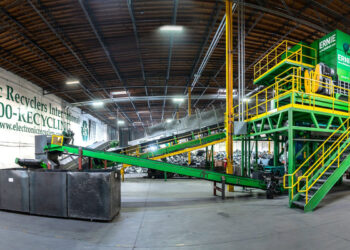The power struggle between South Korean smelting company Korea Zinc and a private equity firm that wants to seize control of the company is continuing, with both using press conferences and statements to publicly attack the other’s business decisions.
Korea Zinc also held a share buyback program to stave off the takeover, spending $1.5 billion in largely borrowed funds to secure 9.85% of the company’s shares. It then announced it would issue $1.8 billion in new stock, with 20% of new shares to be allocated to its employee ownership association.
The takeover attempt started in early September, when shareholder Young Poong – which is owned by one of the co-founding families of Korea Zinc – and private equity firm MBK Partners submitted an unexpected bid to purchase a majority stake in Korea Zinc. Korea Zinc management described the move as a “hostile takeover,” and a public back-and-forth ensued.
Part of the debate is over Korea Zinc’s acquisition of Igneo Holdings, which owns e-scrap operations in the U.S. and Europe. They include evTerra, which has processing plants in Atlanta, Chicago, Las Vegas and San Antonio.
MBK Partners asserts that it was a bad purchase that is losing money, while Korea Zinc maintains it’s part of a long-term business strategy to expand its operations, especially in regards to recycled copper.
In a Dec. 15 press release, Korea Zinc leaders again worked to “debunk false allegations and misleading claims presented by MBK Partners,” in response to a press conference MBK Partners held on Dec. 10.
Korea Zinc said MBK Partners has been using terms “which are neither standard in accounting practices nor widely recognized in financial analysis,” such as “lost EBITDA opportunity,” “lost enterprise value opportunity” and “lost shareholder value opportunity.”
“By using speculative assumptions and unverified data, MBK has attempted to mislead shareholders, the market and the media, significantly damaging Korea Zinc’s reputation,” according to the release.
And in response to MBK’s assertions that Korea Zinc has been spending funds without proper board oversight, and racking up corporate value losses, “this assertion clearly demonstrates MBK’s lack of long-term vision and understanding of the new businesses Korea Zinc is pursuing,” Korea Zinc said.
“This also highlights MBK’s inability to manage the company in an effective way,” the company warned. “MBK’s interpretation of Korea Zinc’s financial investment activities and business investments reflect a misunderstanding and appears to rely on selective data presentation.”
Korea Zinc accused MBK of ignoring “the severe corporate value erosion at Young Poong, their partner in this hostile M&A against Korea Zinc.” Due to the hostile takeover attempt, Korea Zinc said it purchased treasury shares through a share buyback program, resulting in added costs that harmed the company’s value.
Kim Kwang-il, vice chairman of MBK Partners, said at the Dec. 10 conference that he plans to use the upcoming Jan. 23 Korea Zinc shareholder to improve the governance of Korea Zinc and protect shareholder value.
“As the largest shareholder of Korea Zinc, we will pursue shareholder returns and corporate governance improvement plans after the board restructuring,” he said.
Those plans include a stock split, the complete cancellation of treasury shares, to regularly disclose the dividend policy, and to create an internal transaction committee to review transactions.






























